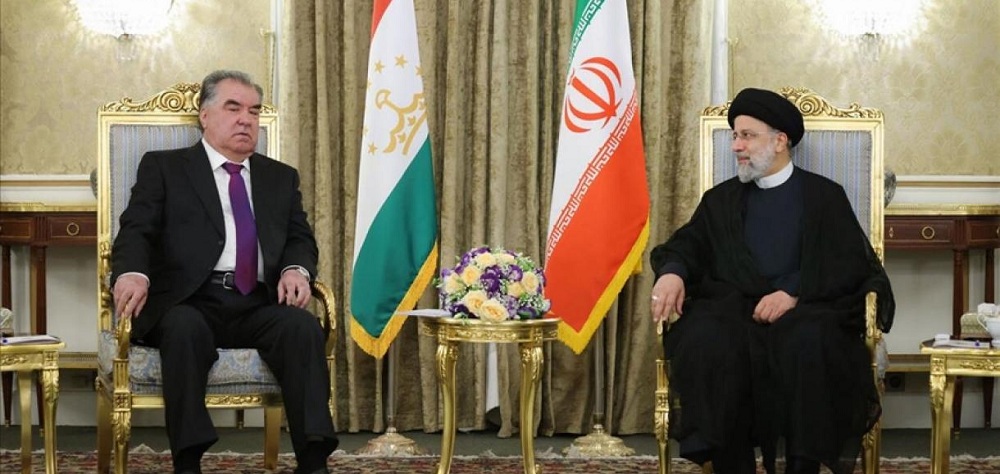Alwaght- Tajikistan President Emomali Rahmon arrived in Tehran on Sunday heading a high-ranking economic delegation and met with his Iranian counterpart Sayyed Ibrahim Raeisi. The two sides discussed bilateral cooperation and signed several partnership documents in science, politics, and culture.
In recent years, convergence in Iran-Tajikistan relations has been strengthened, and a President Raeisi's visit to Tajikistan in September last year marked a new chapter in comprehensive cooperation between Tehran and Dushanbe. During the visit, eight economic cooperation documents were signed and the partnership level is set for improvement in the future.
Despite cultural, religious, and lingual similarities between Iran and Tajikistan, their relations are at a low level, and this put the development of bilateral cooperation on the agenda in new Iranian administration. According to trade data, last year's volume of economic exchanges between Iran and Tajikistan was $131 million, showing 400 percent growth compared to the year before and that their economic cooperation is strengthening. During the meeting of officials in Tehran, the enhancement of trade was a top discussion case.
Tajikistan has the potentials and capacities to become a top Iran trade partner and a destination for Iranian products in Central Asia. In the past, Iranian companies participated in various Tajikistan dam and hydroelectric power plant projects, and closer relations can broaden the domain of this presence.
With the boost of economic cooperation, Tajikistan can also benefit from the North-South Corridor of Iran and gain access to high seas and thus export its goods to other countries. This issue is crucial in the current situation due to the closure of European borders to Russia. Finding alternative routes for the export of goods is on the agenda of the Dushanbe leaders, and Iran can provide economical and short routes.
Rising insecurity in the region and Ukraine crisis is driving the countries to regional convergence. Central Asian countries are no exception, seeking to increase their political, economic, and security cooperation with their neighbors.
The visit of the Tajikistan president in present conditions can be examined from another dimension. As the West foists more sanctions on Russia over the Ukraine war, Central Asian countries, especially Tajikistan, will also suffer. So, Tajikistan, which gets most of its energy from Russia, is looking for alternative suppliers to meet its needs, and Iran is one of them if Russian exports decline.
Rahmon's visit to Tehran, coming nine years after the last one, has also security aspects. With Iran and Tajikistan feeling threatened by terrorism in Afghanistan, they are working to increase their cooperation to counter these threats. The mounting terrorist attacks in Afghanistan in recent months have set off the alarm bells about the spread of these threats to the region, and stirring regional efforts to prevent them. The most recent effort in this regard is a regional summit hosted by Tajikistan last week. Tehran and Dushanbe have bolstered their security and defense cooperation over the past year, and the visit to Tajikistan of Iran's Chief of General Staff General Mohammad Bagheri in mid-May and founding a "Counterterrorism Commitee" last year indicate that security is a case of focus in their partnership. Iran can substantially provide support to Tajikistan because of its precious experience in fight against terrorism.
Tajikistan is militarily dependent on Russia, and Russian involvement in Ukraine war can reduce Moscow's military support to Dushanbe as Russia sees shift in its military priorities. Tehran can provide support for Tajikistan to secure its territory and contribute to regional security. Tajikistan's affirmative vote for Iran's membership at last year's SCO meeting also showed that the two countries are on track to increase cooperation.
Also, given the possibility of a decline in Russian arms exports to Central Asia, Tajikistan is trying to make new arrangements for its security, and Iran can an option for it to make up for its arms shortfall. On May 17, Iran opened a military drone factory production in Tajikistan, paving the way for joint military ventures.
Exchange of visits between Iranian and Tajik officials and signing tens of economic, security, and political agreements in recent years are expressive of efforts for partnership boost. Cultural and lingual commonalities provide a proper ground for deepening the bilateral ties to which a clear outlook can be predicted as more visits are expected in the future.



























